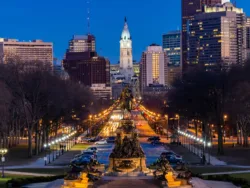
You have probably heard about the national opioid crisis in the news at some point. The terms “opioid crisis” and “opioid epidemic” are used to describe the increase in opioid overdoses and deaths in the United States. Urban areas are particularly susceptible, and Philadelphia has been no exception.
Here’s what you need to know about this epidemic and how we can all work to end it.
History of the Opioid Crisis
According to the U.S. Department of Health and Human Services, the opioid crisis started in the 1990s when pharmaceutical companies told doctors that patients wouldn’t develop an addiction to opioid pain relievers. This led to doctors prescribing opioids at higher rates.
Unfortunately, many patients did become addicted after taking a pain medication. This led to an increase in substance abuse, overdoses, and deaths across the country. In 2017, the HHS declared the opioid crisis a public health emergency.
Although an increase in prescriptions greatly contributed to this crisis, it’s also important to address the role of mental health in addiction. Many people abuse substances to help them cope with an underlying mental health condition.
How Philadelphia Has Been Affected by the Opioid Crisis
Philadelphia has been hit hard by this epidemic. Consider these statistics:
- Since 2010, opioid related deaths in the city have increased each year.
- In 2017, Philadelphia reported 1,217 overdose deaths from all types of drugs. 1,074 (or 88%) involved opioids.
- Philadelphia had 1,116 opioid-related deaths in 2018, and estimates for 2019 are close to the same amount.
- The number of overdose deaths in the city is higher than the number of deaths from homicides. This is true across all racial and ethnic groups.
- Philadelphia County has the highest overdose rate of any of the 10 most populous counties in America.
The Neighborhood of Kensington
The Philadelphia neighborhood of Kensington is considered the epicenter of the opioid crisis in the city. This neighborhood has one of the highest rates of heroin overdose in the nation and is the largest open-air narcotics market for heroin on the East Coast. At one point, the neighborhood was under a disaster declaration.
Volunteers, city officials, and police are working to combat the frequent drug use in Kensington. While progress has been made, this is still an ongoing effort.
Opioids Being Mixed with Meth
Another growing concern is the sharp increase of methamphetamine use throughout Philly. According to The Philadelphia Inquirer, an increase in the supply of methamphetamine in the city has driven down its price, leading many opioid users to cut the substance in with opioids like heroin and fentanyl. As a result, Temple University’s Episcopal Hospital saw a 33% increase in the number of patients testing positive for meth in 2018 over 2017.
Opioids have many devastating effects on their own. Combined with meth, the two substances can cause even greater harm and increase the risk of overdose. In fact, most fatal overdoses are the result of mixing multiple drugs.
The State’s Response to the Opioid Epidemic
Governor Tom Wolf has made it a priority to fight the opioid epidemic in Pennsylvania. He has taken many steps to address the situation at the state government level, including the following initiatives:
- Expanded Medicaid coverage for substance use disorder treatment
- Signed a statewide disaster declaration that included 13 initiatives to combat the epidemic
- Created Centers of Excellence to provide whole-person care for those living with a substance use disorder
- Expanded Pennsylvania’s Prescription Drug Monitoring Program to reduce access to multiple prescriptions for opioids
- Provided first responders with naloxone for reversing overdoses
Overdose deaths did begin to slow in 2018. Despite this, opioid-related deaths are still high and the city of Philadelphia has begun taking measures to fight opioid abuse and save lives.
Philadelphia’s Opioid Crisis Response
The city’s response includes educating the public on the realities and dangers of the opioid crisis, expanding access to treatment, and increasing law enforcement resources.
In order to curb the number of overdoses, the Mayor’s Taskforce recommends taking three actions:
- Call 911 – If you believe someone is overdosing, you should immediately call 911. The Good Samaritan Law protects individuals who report overdoses.
- Get naloxone – Also known as the brand name Narcan, naloxone blocks the effects of opioids and helps a person to start breathing. It is used to treat opioid overdose in emergency situations.
- Seek substance abuse treatment – Whether you or someone that you know has overdosed, it’s crucial to seek treatment to help prevent another overdose from occurring.
Initiatives for 2020
The Philadelphia Inquirer reported that the city is increasing its response to the opioid epidemic for 2020. This includes:
- Hiring peer specialists (individuals who are currently in recovery from substance use disorder) to help get more people into treatment
- Expanding Temple University Health System’s treatment programs and referrals with help from a state grant
- Increasing mobile treatments in neighborhoods with fewer treatment options
- Offering treatment and social services rather than arresting drug offenders
- Creating a local data reporting system for pharmacies to spot opioid abuse or illicit use
Getting Treatment for Opioid Abuse
Past approaches to illegal drug use have focused on incarceration. However, the response to the opioid epidemic has largely advocated for addiction treatment. Perhaps this is due to greater awareness that addiction is a disease, not a moral failing.
There are several methods treatment centers are using to help people overcome addiction.
Medically Supervised Detox
Before the work of recovery can begin, individuals living with an addiction must go through a period of detoxification. This means they abstain from drugs and clear their body of all substances. Detox should always be medically supervised because it can cause dangerous withdrawal symptoms.
Structured Treatment Programs
Most people find success in recovery through highly structured programs offered by certified treatment centers. A treatment program may combine different types of therapy with medication-assisted treatment and even holistic services like yoga and art therapy.
Ongoing Support
After completing a formal treatment program, most people need additional support to maintain their recovery. This could include regular outpatient counseling sessions, community support groups, sober housing and more.
If you are part of the Philadelphia community and you or someone you know is abusing opioids, Rehab After Work has treatment locations in Center City and Northeast Philadelphia. We offered structured outpatient treatment programs to help our clients overcome substance use.
We are committed to being a part of the solution to the opioid epidemic. Contact our admissions team to get help for yourself or a loved one.






